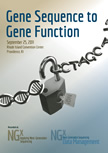CONFERENCE SERIES: Genomics
Recorded at: NGx: Applying Next-Generation Sequencing

 About this Product:
About this Product:
Sequencing of whole genomes is advancing exponentially. While these genome sequencing efforts reveal the basic building blocks of life, a genome sequence alone is insufficient for elucidating biological function. In addition, there is a real opportunity and clear need to generate associated functional genomic data. This digital course is designed provide the scientific basis of bridging the gap between gene sequence and gene function.
About this Product:
4 Presentations
Over 139 slides
130 minutes
Single Copy - $345.00
Site License - $1,380.00
Agenda At A Glance:
Illuminating Evolutionary Constraints by Systematic Mutation and Deep Sequencing
 Daniel Bolon, Ph.D., Assistant Professor, Biochemistry and Molecular Pharmacology, University of Massachusetts Medical School
Daniel Bolon, Ph.D., Assistant Professor, Biochemistry and Molecular Pharmacology, University of Massachusetts Medical School
Biography: Daniel Bolon is an Associate Professor in Biochemistry and Molecular Pharmacology at the University of Massachusetts Medical School. Dan earned a B.S. from Duke University and for his graduate work, studied computational enzyme design with Steve Mayo at the California Institute of Technology, obtaining his Ph.D., in Biochemistry and Molecular Biophysics. He has also worked as a postdoctoral researcher with Bob Sauer in the Biology Department at the Massachusetts Institute of Technology using a variety of biochemical and biophysical techniques including X-ray crystallography, fluorescence, analytical ultracentrifugation, and protein engineering to study AAA+ proteases. Dan was awarded a NIH fellowship to support his postdoctoral studies. He has pioneered approaches for high throughput analysis of point mutant fitness utilizing deep sequencing. Throughout his career, he has developed and applied new technology to address fundamental question in biology and medicine.
Functional Annotation of Single Nucleotide Variants in Cancer
 Michael Krauthammer, Ph.D., Associate Professor, Pathology, Yale University School of Medicine
Michael Krauthammer, Ph.D., Associate Professor, Pathology, Yale University School of Medicine
Biography: Dr. Michael Krauthammer is an Associate Professor in Pathology at the Yale University School of Medicine. He received his M.D. degree at the University of Zurich, Switzerland. After board certification (general practitioner), he obtained a Ph.D. in biomedical informatics at Columbia University in New York and joined the Yale Pathology Informatics program in July 2004. His main research interests are the design of large-scale text and image mining systems and research in translational informatics, specifically as it relates to analysis of high-throughput sequencing data, and Omics data management. He is the co-director of the Bioinformatics/biostatistics Core of the Yale SPORE in Skin Cancer, and co-director of the CTSA biomedical informatics Core.
A Computational Approach to Detect Chimeric Transcripts with Paired-End RNA-Seq Experiments: FusionSeq
 Andrea Sboner, Ph.D., Associate Research Scientist, Computational Biology and Bioinformatics, Molecular Biophysics and Biochemistry, Yale University
Andrea Sboner, Ph.D., Associate Research Scientist, Computational Biology and Bioinformatics, Molecular Biophysics and Biochemistry, Yale University
Biography: Dr. Andrea Sboner is currently a Professor at the Department of Pathology and Laboratory Medicine and at the Institute for Computational Biomedicine, Weill Cornell Medical College. Andrea obtained his Ph.D., from the University of Trento, Italy conducting research in biomedical informatics. He applied machine learning tools to support the clinical diagnosis of melanoma and to modeling clinical reasoning. At Yale University for his post-doctoral research under the supervision of Mark Gerstein, he focused on large-scale data analysis applied to cancer genomics. In close collaboration with Mark Rubin at Weill Cornell Medical College, he developed tools for the processing and analysis of next-generation sequencing experiments. In particular, he developed FusionSeq, a computational framework to detect chimeric transcripts from paired-end RNA-seq data. Currently he focuses on applying computational tools to elucidate the complexity of the cancer genome and transcriptome.
Using the Probabilistic Disease-Gene Finder, VAAST, to Identify a New and Very Rare Mendelian Syndrome
 Gholson Lyon, M.D., Ph.D., Research Scientist, Pediatrics, Center for Applied Genomics, Children’s Hospital of Philadelphia
Gholson Lyon, M.D., Ph.D., Research Scientist, Pediatrics, Center for Applied Genomics, Children’s Hospital of Philadelphia
Biography: Gholson J. Lyon is a Research Scientist at the Center for Applied Genomics at The Children’s Hospital of Philadelphia and an adjunct assistant professor of Psychiatry at N.Y.U. School of Medicine. He is a board-certified child, adolescent and adult psychiatrist. He earned an M.Phil. in Genetics, working with Nobel laureate Martin Evans in Cambridge, UK, then received a Ph.D. and M.D. through the combined Cornell/Sloan-Kettering/Rockefeller University training program. He has published peer-reviewed papers in biochemistry, genetics, pharmacology and molecular biology. In addition to his research interest in neuropsychiatric illnesses, Dr. Lyon is focusing on the discovery of rare heretofore undiscovered Mendelian diseases.
About the Conference:
NGS platforms now generate terabytes of genomic data, calling into question: What is the best way to benefit from this data bonanza? CHI’s Next-Generation Sequencing Data Management combines unique perspectives from a variety of researchers, engineers, biostatisticians, and software developers involved with NGS data management. This team of scientists will present case studies creating a common ground on which to explore how best to store, transfer, and analyze NGS data sets with the common goal of turning data into knowledge.